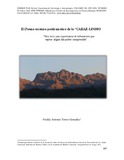| dc.rights.license | http://creativecommons.org/licenses/by-nc-sa/3.0/ve/ | es_VE |
| dc.contributor.author | Torres González, Freddy Antonio | |
| dc.date.accessioned | 2020-12-03T15:44:31Z | |
| dc.date.available | 2020-12-03T15:44:31Z | |
| dc.date.issued | 2020-12 | |
| dc.identifier.issn | 0798-3069 | |
| dc.identifier.uri | http://www.saber.ula.ve/handle/123456789/47166 | |
| dc.description.abstract | El teatro posdramático propone una doble tensión. La primera resulta de la autonomía del arte
escénico respeto al drama; la segunda, tensión resulta de la reivindicación del teatro como medio
desde la categoría de la performatividad. Desde esta doble tensión, el poema escénico que se
construye desde el acontecimiento hace que los actores se comporten de manera aparentemente privada y
espontánea, habitan la escena. Incluso cuando actúan no crean la reunión de personajes; la escena se
convierte en un estado complejo de espacios asociados compuestos por una lírica absoluta, una
alquimia estética que proviene del entrenamiento de la biomecánica de Meyerhold y el teatro y su
doble de Artaud , para elaborar el discurso de la obra Carae’ Lindio. La dramaturgia visual usurpa el
lugar ocupado por el texto. | es_VE |
| dc.language.iso | es | es_VE |
| dc.publisher | SaberULA | es_VE |
| dc.rights | info:eu-repo/semantics/openAccess | es_VE |
| dc.subject | Posdramático | es_VE |
| dc.subject | Arte escénico | es_VE |
| dc.subject | Estética | es_VE |
| dc.subject | Biomecánica | es_VE |
| dc.subject | Entrenamiento | es_VE |
| dc.subject | Acontecimiento | es_VE |
| dc.subject | Actor | es_VE |
| dc.subject | Presencia | es_VE |
| dc.subject | Glosolalia | es_VE |
| dc.subject | Discurso | es_VE |
| dc.title | El poema escénico posdramático de la “Carae-Lindio” | es_VE |
| dc.title.alternative | The post-dramatic stage poem of the "Carae-Lindio" | es_VE |
| dc.type | info:eu-repo/semantics/article | es_VE |
| dc.description.abstract1 | Post-dramatic theater proposes a double tension. The first results from the autonomy of stage art
with respect to drama (of the scenic art with respect to the drama); the second tension results from
the vindication of the theater as a medium from the category of performativity. From this double
tension, the scenic poem that is constructed from the event makes the actors behave in an apparently
private and spontaneous way, they inhabiting the scene. Even when they act they don't create the
meetingof characters; the scene becomes a complex state of associated spaces composedof an absolute
lyric, an aesthetic alchemy that comes from the training of Meyerhold's biomechanics and the theater
and his double from Artaud, to elaborate the discourse of the play Carae ?Lindio. Visual dramaturgy
usurps the place occupied by the text. | es_VE |
| dc.description.colacion | 167-194 | es_VE |
| dc.description.email | fermenta@ula.ve | es_VE |
| dc.description.frecuencia | Cuatrimestral | |
| dc.description.paginaweb | www.saber.ula.ve/fermentum | |
| dc.identifier.depositolegal | pp1991102ME302 | |
| dc.publisher.pais | Venezuela | es_VE |
| dc.subject.institucion | Universidad de Los Andes | es_VE |
| dc.subject.keywords | Post-dramatic | es_VE |
| dc.subject.keywords | Scenic art | es_VE |
| dc.subject.keywords | Aesthetics | es_VE |
| dc.subject.keywords | Biomechanics | es_VE |
| dc.subject.keywords | Training | es_VE |
| dc.subject.keywords | Event | es_VE |
| dc.subject.keywords | Actor | es_VE |
| dc.subject.keywords | Presence | es_VE |
| dc.subject.keywords | Glossolalia | es_VE |
| dc.subject.keywords | Speech | es_VE |
| dc.subject.seccion | Fermentum: Artículos | es_VE |
| dc.subject.tipo | Artículos | es_VE |
| dc.type.media | Texto | es_VE |


